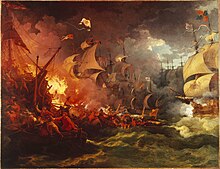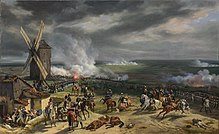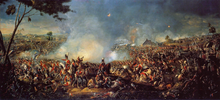
A battle is an occurrence of combat in warfare between opposing military units of any number or size. A war usually consists of multiple battles. In general, a battle is a military engagement that is well defined in duration, area, and force commitment. An engagement with only limited commitment between the forces and without decisive results is sometimes called a skirmish.

The Battle of Marathon took place in 490 BC during the first Persian invasion of Greece. It was fought between the citizens of Athens, aided by Plataea, and a Persian force commanded by Datis and Artaphernes. The battle was the culmination of the first attempt by Persia, under King Darius I, to subjugate Greece. The Greek army inflicted a crushing defeat on the more numerous Persians, marking a turning point in the Greco-Persian Wars.

The Battle of Gettysburg was a three-day battle in the American Civil War fought between Union and Confederate forces between July 1 and July 3, 1863, in and around Gettysburg, Pennsylvania. The battle, which was won by the Union, is widely considered the Civil War's turning point, ending the Confederacy's aspirations to establish an independent nation. It was the Civil War's bloodiest battle, claiming over 50,000 combined casualties over three days.
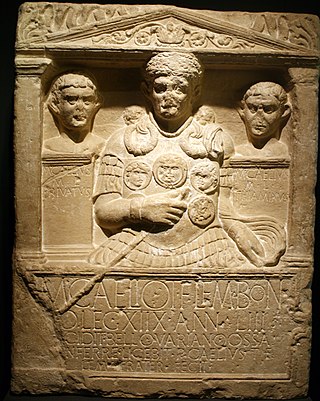
The Battle of the Teutoburg Forest, described as the Varian Disaster by Roman historians, was a major battle between Germanic tribes and the Roman Empire that took place somewhere near modern Kalkriese from September 8–11, 9 AD, when an alliance of Germanic peoples ambushed three Roman legions led by Publius Quinctilius Varus and their auxiliaries. The alliance was led by Arminius, a Germanic officer of Varus's auxilia. Arminius had acquired Roman citizenship and had received a Roman military education, which enabled him to deceive the Roman commander methodically and anticipate the Roman army's tactical responses.
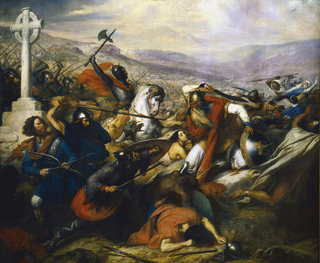
The Battle of Tours, also called the Battle of Poitiers and the Battle of the Highway of the Martyrs, was fought on 10 October 732, and was an important battle during the Umayyad invasion of Gaul. It resulted in the victory for the Frankish and Aquitanian forces, led by Charles Martel, over the invading Muslim forces of the Umayyad Caliphate, led by Abd al-Rahman al-Ghafiqi, governor of al-Andalus. Several historians, such as Edward Gibbon, have credited the Christian victory in the battle as an important factor in curtailing the Islamization of Western Europe.
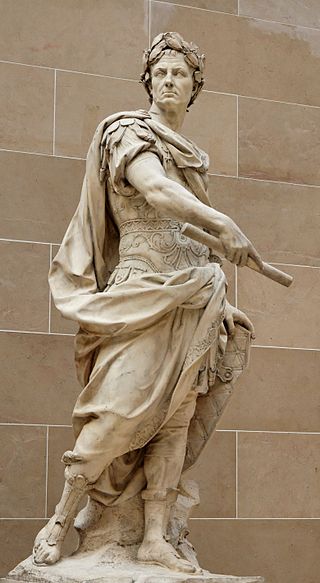
The following outline is provided as an overview of and topical guide to ancient Rome:

Arminius was a chieftain of the Germanic Cherusci tribe who is best known for commanding an alliance of Germanic tribes at the Battle of the Teutoburg Forest in AD 9, in which three Roman legions under the command of general and governor Publius Quinctilius Varus were destroyed. His victory at Teutoburg Forest precipitated the Roman Empire's permanent strategic withdrawal from Germania Magna, and modern historians regard it as one of Rome's greatest defeats. As it prevented the Romanization of Germanic peoples east of the Rhine, it has also been considered one of the most decisive battles in history and a turning point in human history.

The Battle of Valmy, also known as the Cannonade of Valmy, was the first major victory by the army of France during the Revolutionary Wars that followed the French Revolution. The battle took place on 20 September 1792 as Prussian troops commanded by the Duke of Brunswick attempted to march on Paris. Generals François Kellermann and Charles Dumouriez stopped the advance near the northern village of Valmy in Champagne-Ardenne.

The Battle of Gaugamela, also called the Battle of Arbela, took place in 331 BC between the forces of the Army of Macedon under Alexander the Great and the Persian Army under King Darius III. It was the second and final battle between the two kings, and is considered to be the final blow to the Achaemenid Empire, resulting in its complete conquest by Alexander.

The Battle of Plataea was the final land battle during the second Persian invasion of Greece. It took place in 479 BC near the city of Plataea in Boeotia, and was fought between an alliance of the Greek city-states, and the Persian Empire of Xerxes I.

Callimachus was the Athenian polemarch at the Battle of Marathon, which took place during 490 BC. According to Herodotus he was from the Attic deme of Aphidna.

Hasdrubal Barca, a latinization of ʿAzrubaʿal son of Hamilcar Barca, was a Carthaginian general in the Second Punic War. He was the brother of Hannibal and Mago Barca.

Sir Edward Shepherd Creasy was an English historian and jurist.

Major General Hon. Sir Frederick Cavendish Ponsonby was an Anglo-Irish military officer.

Gaius Claudius Nero was a Roman general active during the Second Punic War against the invading Carthaginian force, led by Hannibal Barca. During a military career that began as legate in 214 BC, he was praetor in 212 BC, propraetor in 211 BC during the siege of Capua, before being sent to Spain that same year. He became consul in 207 BC.

Miltiades, also known as Miltiades the Younger, was a Greek Athenian citizen known mostly for his role in the Battle of Marathon, as well as for his downfall afterwards. He was the son of Cimon Coalemos, a renowned Olympic chariot-racer, and the father of Cimon, the noted Athenian statesman.
The Battle of Singara was fought in 344 between Roman and Sasanian Persian forces. The Romans were led in person by Emperor Constantius II, while the Persian army was led by King Shapur II of Persia. It is the only one of the nine pitched battles recorded to have been fought in a war of over twenty years, marked primarily by indecisive siege warfare, of which any details have been preserved. Although the Persian forces prevailed on the battlefield, both sides suffered heavy casualties.
The title of King of the Goths was for many centuries borne by both the kings of Sweden and the kings of Denmark.
A decisive victory is a military victory in battle that definitively resolves the objective being fought over, ending one stage of the conflict and beginning another stage. Until a decisive victory is achieved, conflict over the competing objectives will continue.

Military history is the study of armed conflict in the history of humanity, and its impact on the societies, cultures and economies thereof, as well as the resulting changes to local and international relationships.



